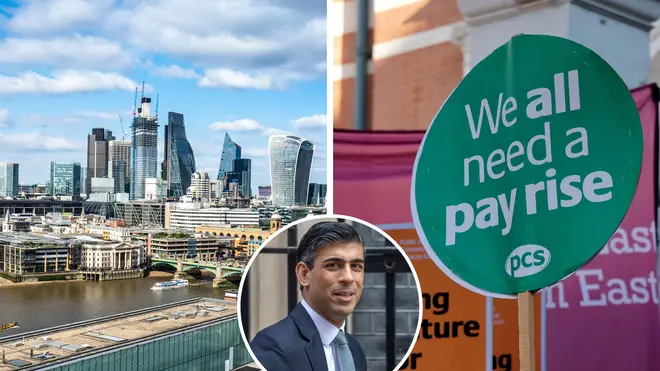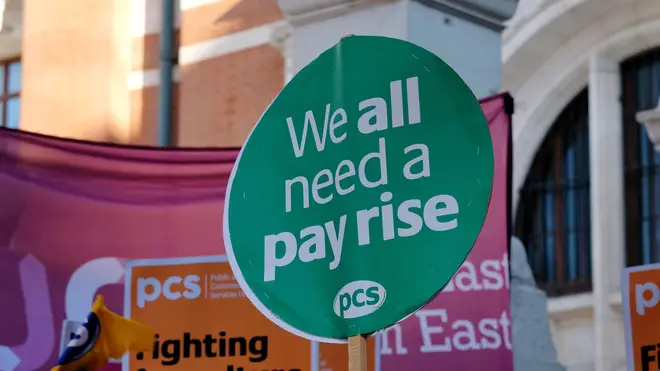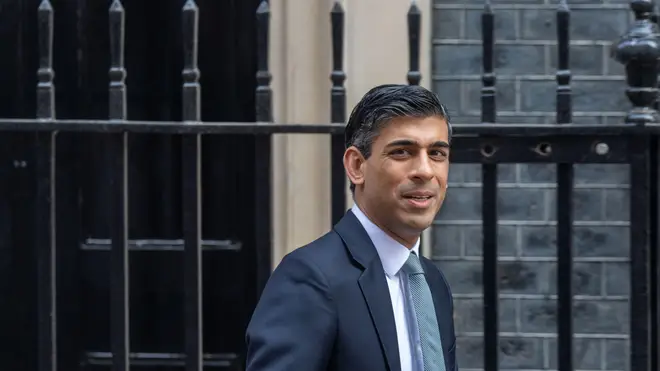
Oli Dugmore 4am - 7am
21 June 2022, 09:45

The Government has come under fire for planning to relax controls on City bosses' pay while calling for wage restraint in the public sector.
The Cabinet Office minister is said to have written to the Chancellor with a plan for "deregulatory measures to reduce the overall burden on business" and attract more companies to the UK following Brexit.
This would involve removing restrictions on director and non-executive director remuneration, according to a leaked copy of the letter seen by the i newspaper.
Read more: Rail strike called under 'false pretences' by RMT's '1970s union baron' boss, says Shapps
Read more: UK grinds to a halt as biggest rail strikes in 30 years begin
LBC's Nick Ferrari put the reports to transport secretary Grant Shapps on Tuesday morning.
"The bosses can come over for telephone numbers, but if you work on the railway you'll get three per cent," Nick said.
"Discuss."
In response, Mr Shapps acknowledged he was not aware of the story until this morning and hit out at the "left-leading paper which probably has an axe to grind".
When asked if the story was purely politically motivated on the newspaper's part, Mr Shapps said: "It could well be."

Shapps put on the spot over City bosses's pay
When asked how the story looked, he said he was only able to comment on his remit and said he had tried to push down the wages of senior executives at the railways.
"I've actually always thought that rail pay, including for senior execs, is high and I've always taken the view of trying to push that down, and since I've been in post," he said.
"I've pushed down their pay by 10 per cent, the most senior execs.
"The new chief executive of Network Rail is paid 28 per cent less than his predecessor.
"So I've been very proactive in ensuring we're paying less - on the bit that I know about, railways."
He went on: "The technicalities of city pay is not something I can guide you on very much other than to say London is a major world global financial centre and presumably in competition with others, and there's a difference I think between public money... and private sector money."

The letter from Steve Barclay read: "I trust you'll agree this is a more proportionate regulatory response and reflective of the new approach to regulation outlined in the 'Benefits of Brexit' publication in January."
The paper reported that Mr Barclay requested Business Secretary Kwasi Kwarteng outline further measures to ease the burden on business, referring explicitly to the need to alter curbs on bosses' pay.
The Department for Business, Energy and Industrial Strategy (BEIS) confirmed it is exploring "whether there are any unnecessary restrictions on paying non-executive directors in shares, which could ensure they are fully invested in the success of the company they run".
"If the company does well, directors do well," it added.
Read more: 'Govt considering strike ban for essential services', Business Minister says
Read more: 'It wasn't me': James O'Brien slates govt's Shaggy-esque excuses for crises
It comes as the Prime Minister and Chancellor have argued that discipline and restraint on public sector pay are important now to manage inflationary pressures downwards.
"We have a responsibility to tackle inflation and stop it becoming entrenched," No 10 said.
"To do this we must ensure that pay settlements are sensible and do not scramble to match inflation, and as a result drive up prices as the cost of goods and service increase to incorporate pay rises."

Speaking ahead of a Cabinet meeting on Tuesday, the Prime Minister said: "It is right that we reward our hard-working public sector workers with a pay rise, but this needs to be proportionate and balanced.
"Sustained higher levels of inflation would have a far bigger impact on people's pay packets in the long run, destroying savings and extending the difficulties we're facing for longer."
On Monday, the chief secretary to the Treasury called for "public-sector pay discipline" and "collective society-wide responsibility" in order to prevent a 1970s-style wage-price spiral.
Read more: Ofgem chief warns price cap hike 'could be more' than predicted £800
Read more: Britain's summer of strikers as nurses, teachers and binmen could walk out
The Bank of England last week forecast inflation was set to hit 11 per cent in the autumn as it hiked interest rates to 1.25 per cent - the fifth successive rise.
Labour's leader in the House of Lords, Baroness Smith, accused the Government of using "two sets of rules": one for people on high incomes in the City, and another for workers elsewhere.
She told peers: "On one hand, we're telling those who are working that you must have wage restraint.
"Does it not seem somewhat hypocritical to be saying to the City that those constraints, those curbs that have been in place are to be removed?
"My Lords, it comes back to (the fact) the Government seems to think the rules are for other people, but not for them and their friends."

Shadow business secretary Jonathan Reynolds said: "It's the hallmark of a Government that lurches from crisis to crisis that instead of giving businesses real certainty, they're looking down the sofa for random ideas.
"If this is what an audit review of four years, three consultations and thousands of pounds of taxpayers money has given us, it's clear the Tories are incapable of governing.
"The Conservatives should be doing all they can to make Brexit work by fixing the holes in the Government's patchwork deal.
"Labour will work in partnership with businesses to help create a stronger, more secure economy."
Read more: Millions face working longer due to state pension reform
Read more: Tory MP calls RMT General Secretary Mick Lynch a 'marxist' and 'waste of space'
A BEIS spokesperson said: "As announced last month, we are looking to strengthen the rules on clawing back bonuses from directors if their company collapses to stamp out 'rewards for failure'.
"By the same token, we are also exploring whether there are any unnecessary restrictions on paying non-executive directors in shares, which could ensure they are fully invested in the success of the company they run.
"If the company does well, directors do well."